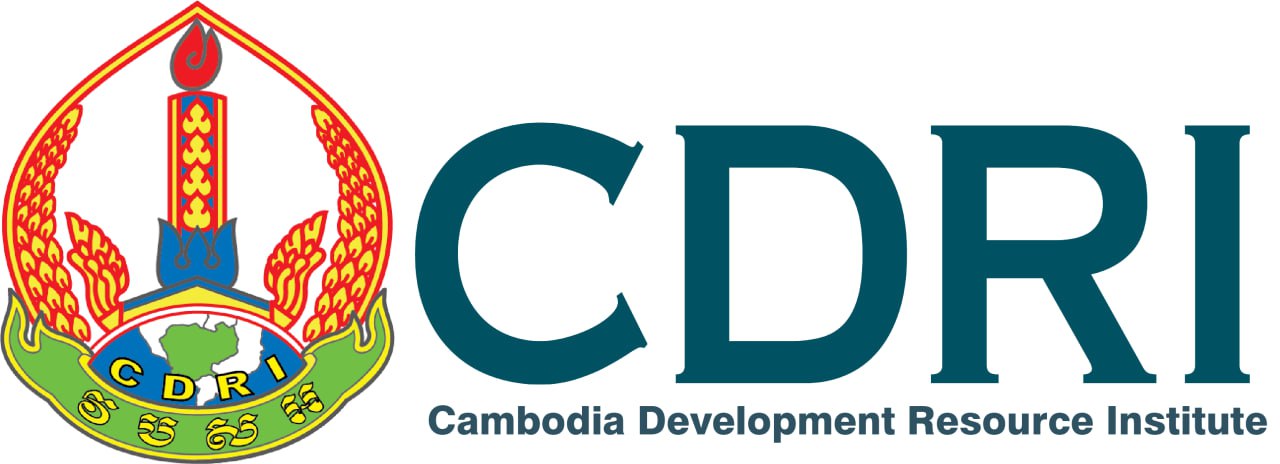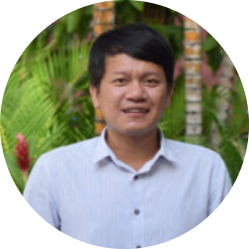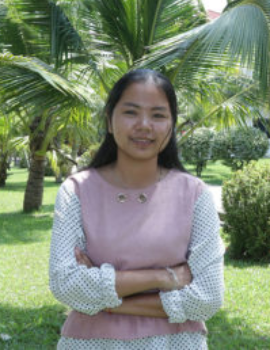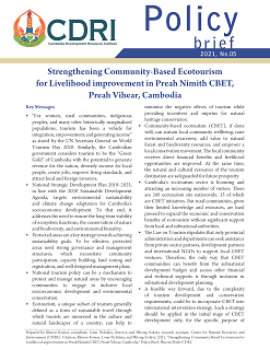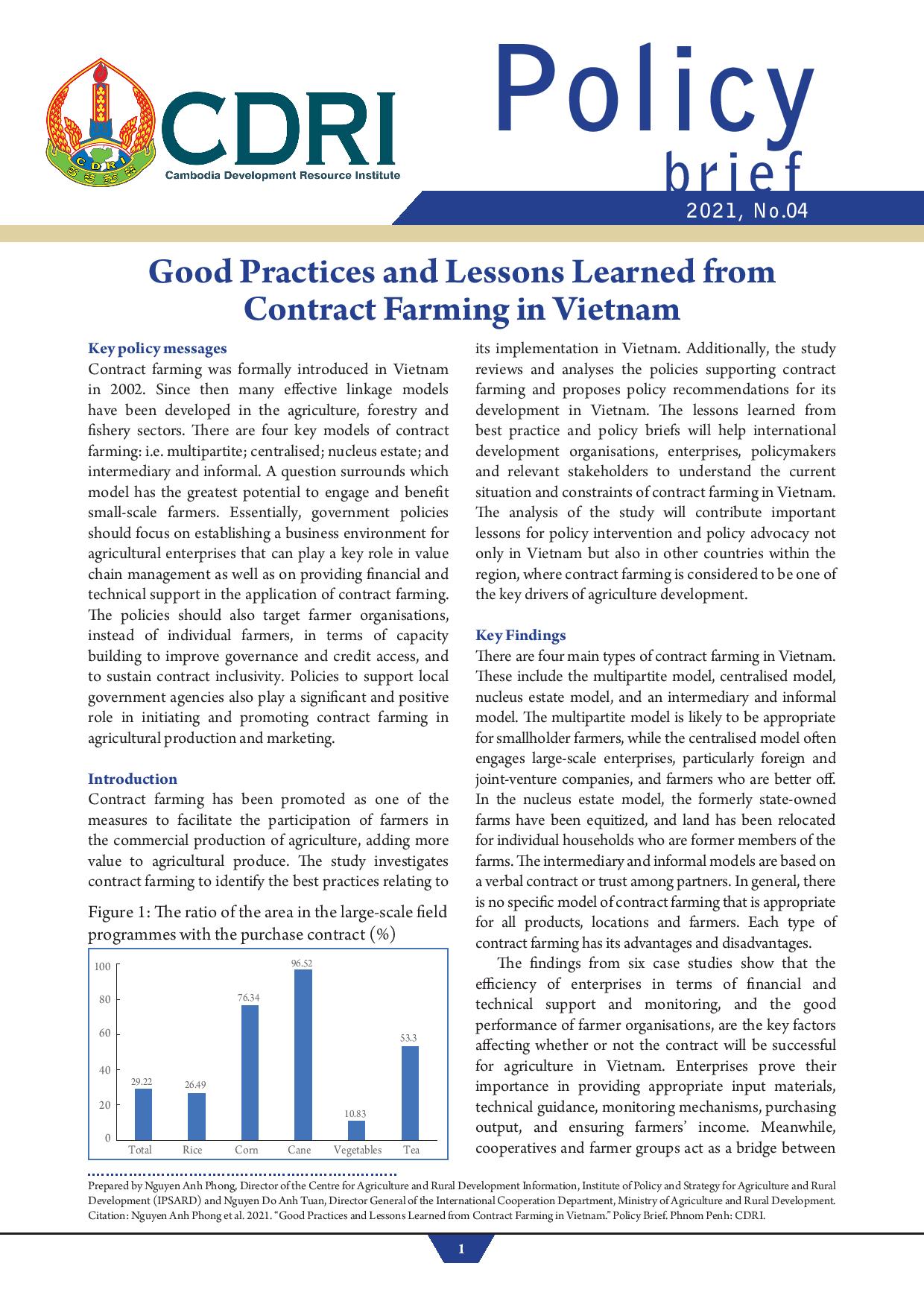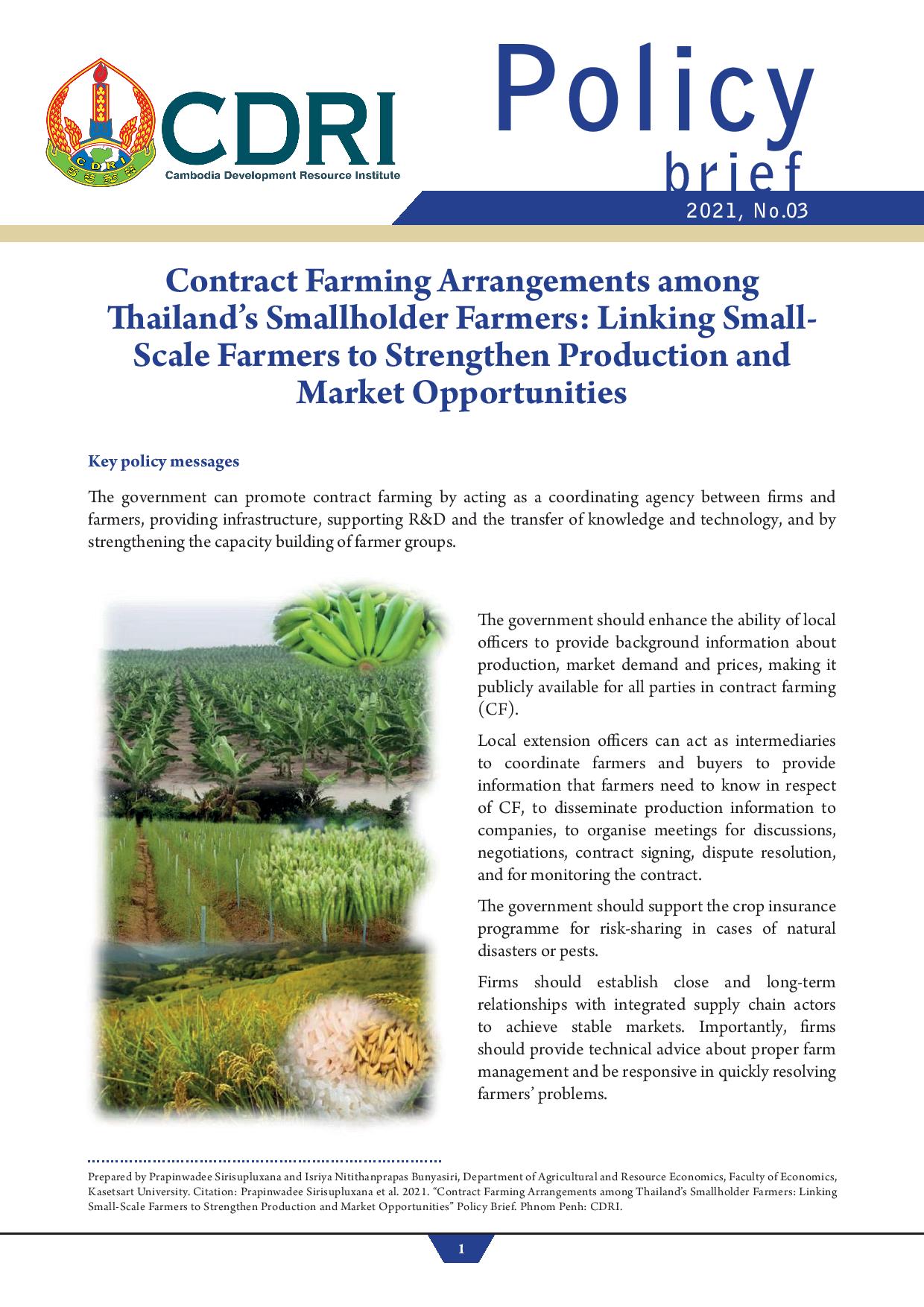Centre for Natural Resources and Environment
The Centre for Natural Resources and Environment (CNRE) conducts policy-oriented and academic researches, focusing on climate change, resource governance, energy, and environmental sustainability. The centre generates evidence-based knowledge through rigorous researches using various methods including integrated modelling techniques, social-ecological system analyses, economic experiments, surveys and in-depth qualitative analysis. The research findings are shared widely among local and international partners, practitioners, and policy makers through publications, policy dialogues, and dissemination workshops. Our researches provide reliable information and scientific evidence for decision makers to make relevant policies, especially contributing to the Royal Government of Cambodia’s rectangle strategies on Angle 4: inclusive sustainable development, sustainable management of natural resources and culture, ensuring environmental sustainability, and primitive response to climate change.
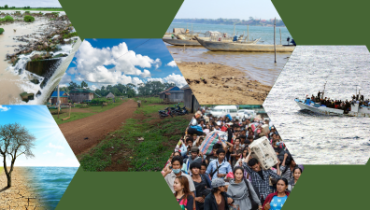
Impacts of Climate Change on Displacement Patterns in Kratie, Mondulkiri and Stung Treng Provinces, Cambodia
International Organization for MigrationLinks between climate change and migration in Cambodia need to be empirically substantiated. It is known that climate change poses a threat to agricultural production and impacts men and women in different ways in terms of a shift...
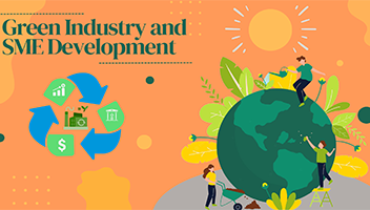
Green Industry and SME Development in Cambodia
AEM-METI Economic and Industrial Cooperation CommitteeGreen SMEs are small and medium-sized enterprises that operate environmentally and sustainably. In Cambodia, MSMEs (Micro-, Small and Medium-sized Enterprises) are the backbone of the economy and constitute more than 90 percent of...
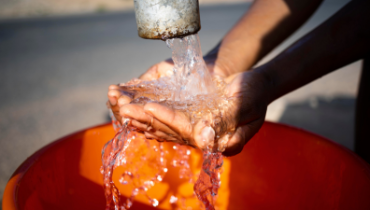
Strengthening Water Resources Management Planning Systems for Inclusive Climate Resilient WASH Services
Water for Women FundClimate resilient water safety planning (WSP) has commenced in Cambodia, and new guidelines have been developed by government agencies to inform and guide climate-resilient water resources management and water security. These two...
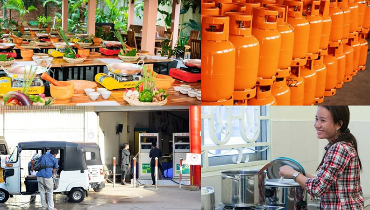
Survey on LPG Consumption Situation in Cambodia
The Economic Research Institute for ASEAN and East AsiaIn Cambodia, the source of fuel for households from liquefied petroleum gas (LGP) accounts for 56 per cent of urban settlements and 11 percent of rural residents, and it ranks second after firewood and charcoal. The source of elec...
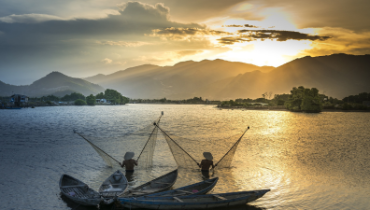
Mekong Thought Leadership and Think Tanks Network
The Department of Foreign Affairs and TradeThe Mekong Thought Leadership and Think Tanks Network Program will address the challenges related to water and energy in the context of climate change impacting the most vulnerable and marginalised in society in Mekong countries....
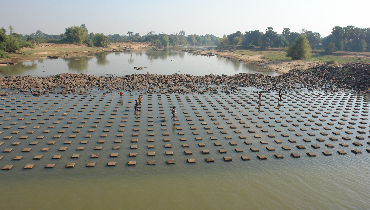
Asian Mega Deltas (AMD) Working Package 4 and Resilient Aquatic Foods in Food, Land and Water Systems (RAqFS) Working Pa...
International Water Management Institute (IWMI)The Asian Mega Deltas (AMD) program is one of the new OneCG initiatives that commenced in April 2022 and will run till at least 31 December 2024 (Phase 1). The One CG involves closer working modalities amongst the numerous CG Cent...
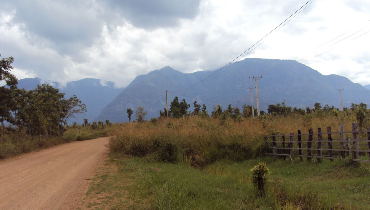
Renewable Energy and Climate Change Perceptions in Cambodia
The Economy and Environment Partnership for Southeast AsiaThis study hypothesizes that the reason for Cambodia’s moving toward a more fossil fuel-based energy could be due to the misperceptions or underestimated co-benefits of renewable energy in relation to the associated costs. If the...
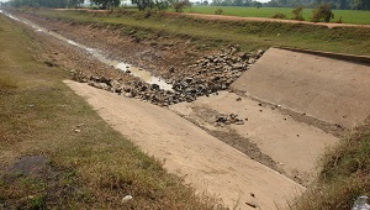
Managing Water Scarcity in the Mekong Region – Cambodia Water Scarcity Profile
Food and Agriculture Organization of the United NationsThe Cambodia water scarcity profile is a stock-taking exercise designed to understand what water scarcity challenges exist in the country and what is the current approach of government to managing water scarcity. The focus is on u...
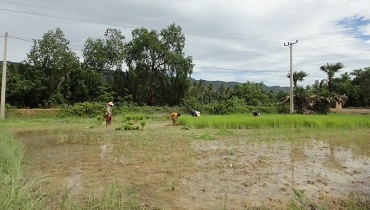
State of Gender Equality and Climate Change in Cambodia
Swedish International Development Cooperation AgencyUnder technical and financial support of UNEP and UNWOMEN, the assessment report is “a tool” to raise awareness about the benefits, advantages and need for gender-responsive climate action, analyse gendered impacts of climate c...
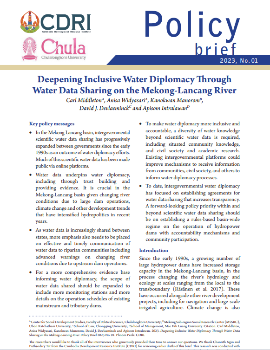
Deepening Inclusive Water Diplomacy Through Water Data Sharing on the Mekong-Lancang River
In the Mekong-Lancang basin, intergovernmental scientific water data sharing has progressively expanded between governments since the early 1990s as an outcome of water diplomacy efforts. Much of this scientific water data has been made public via online platforms.Water data underpins water diplomacy, including through trust building and providing evidence. It is crucial in the Mek...
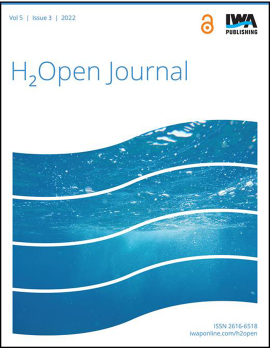
Local Leadership Development and WASH System Strengthening: Insights from Cambodia
To accelerate progress towards achieving the Sustainable Development Goal on clean water and sanitation, the focus of WASH programming in developing countries has shifted from a traditional infrastructure approach to a more systems-based approach. Greater emphasis on a systems approach has also drawn attention to the significant role played by local leadership in developing sustainable WASH system...
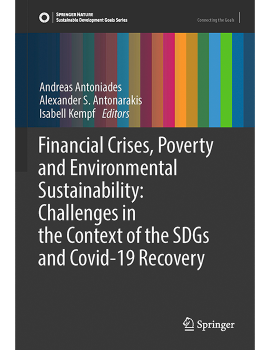
Challenges of Targeting Poor and Vulnerable Groups to Reduce Climate Change Vulnerability: The Case of a Water and Sanitation Project in Kampong Svay...
The escalating climate change-related disasters around the world are a serious threat to human existence and human livelihoods. Rural people living in developing countries, especially those of the poorest, are believed to be particularly vulnerable to climate change. As the number of climate change programs designed to help the poorer households has grown, concern has also arisen over their abilit...
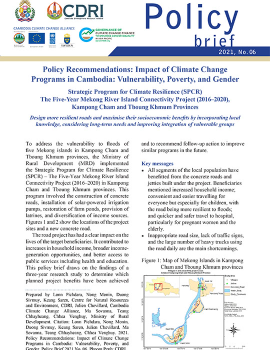
Policy Recommendations: Impact of Climate Change Programs in Cambodia: Vulnerability, Poverty, and Gender
To address the vulnerability to floods of five Mekong islands in Kampong Cham and Tboung Khmum provinces, the Ministry of Rural Development (MRD) implemented the Strategic Program for Climate Resilience (SPCR) – The Five-Year Mekong River Island Connectivity Project (2016–2020) in Kampong Cham and Tboung Khmum provinces. This program involved the construction of concrete roads, installation of sol...
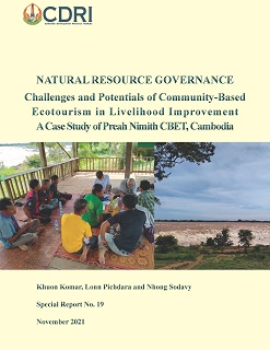
Challenges and Potentials of the Community Based Ecotourism in Livelihood Improvement: A Case Study in Preah Nimith CBET, Cambodia
Community-based ecotourism (CBET) has long been considered an effective natural resource governance policy for both forest conservation and livelihood improvement in developing countries around the world. Cambodia is no exception. The Cambodian government has been promoting and establishing CBET sites countrywide. Preah Nimith CBET, located in a remote part of north Cambodia, is in the vicinity of...
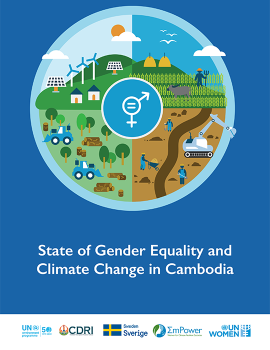
State of Gender Equality and Climate Change in Cambodia
The purpose of this assessment report on gender equality and climate change is to analyse the gendered impacts of climate change and to raise awareness about the benefits of, and need for gender-responsive climate action. The study has two main objectives: i) to strengthen country-driven processes by presenting more evidence of the links between gender equality and climate change and analysin...
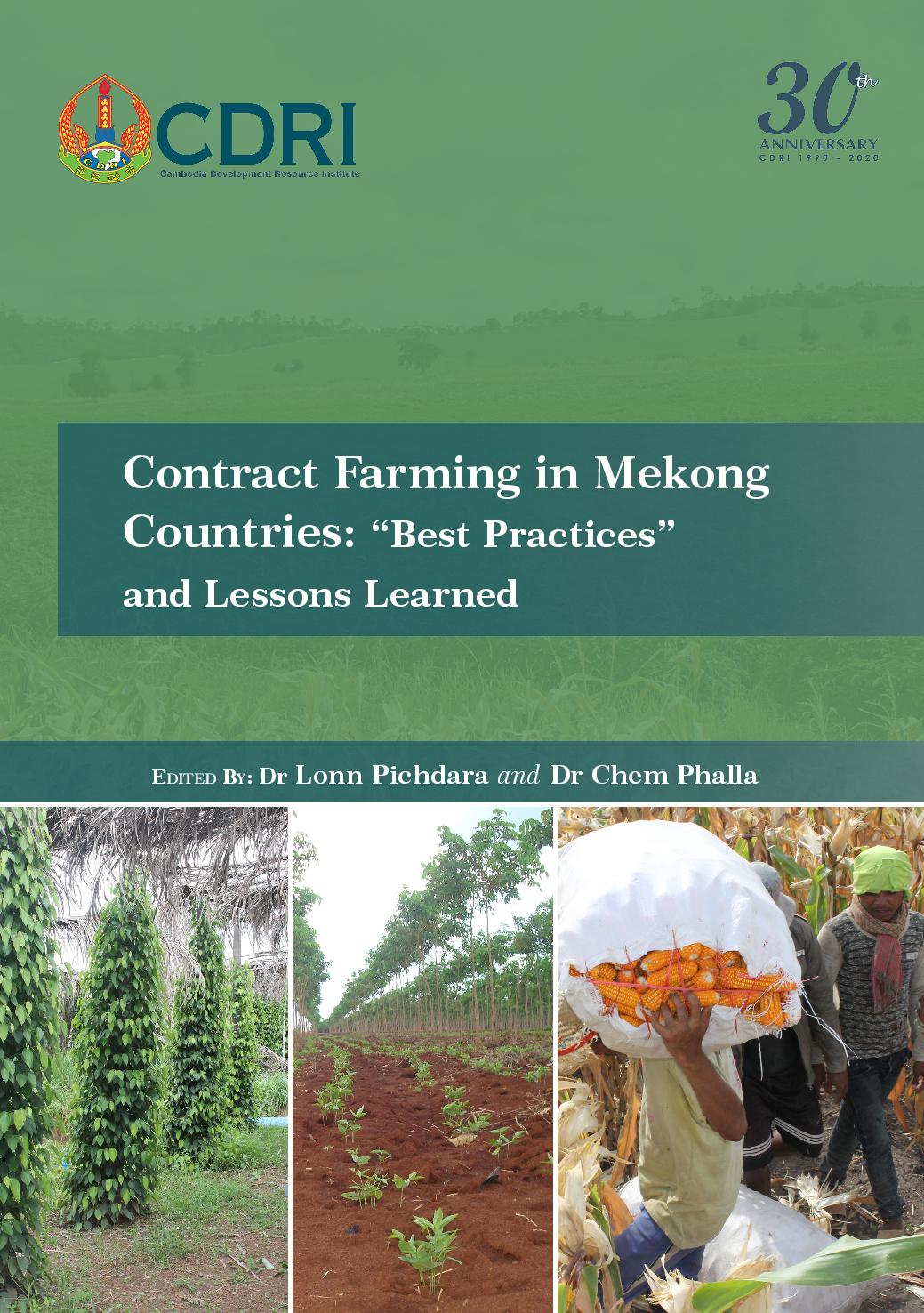
Contract Farming in Mekong Countries: Best Practices and Lessons Learned
This flagship publication is the result of a regional two-year research project entitled: “Enhancing Research and Dialogue on Contract Farming in the Mekong-Lancang Countries”. It represents a close collaboration between CDRI and project partners - the China Agricultural University (CAU), Kasetsart University (Thailand), and the Institute of Policy and Strategy for Agriculture and Rural Developmen...
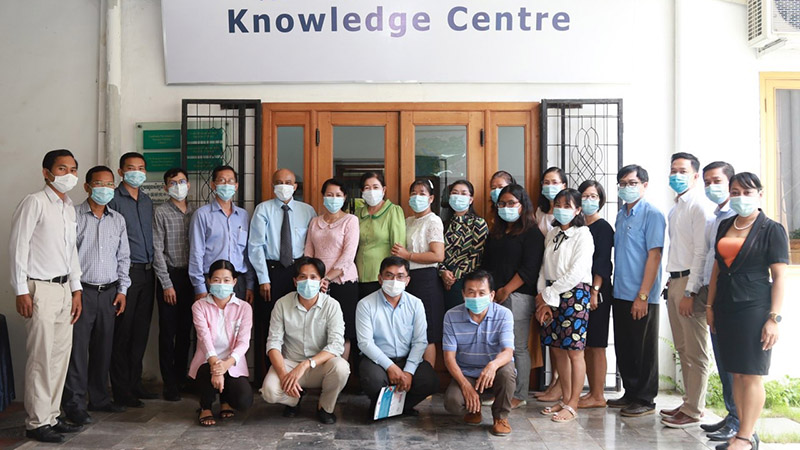
Kick-off Workshop for the Preparation of the State of Gender Equality and Climate Change
On July 15, 2020, the Center for Environment and Natural Resources hosted a kick-off workshop for the preparation of the State of Gender Equality and Climate Change Report. It was attended by 25 participants from UN Women, CDRI, Ministries of Environment, Agriculture, Rural Development, Women's Affairs, and Mines and Energy, and NCDD Secretariat, and Action Aids (CSO). The expected outcome is the national report would become “a tool” to raise awa...
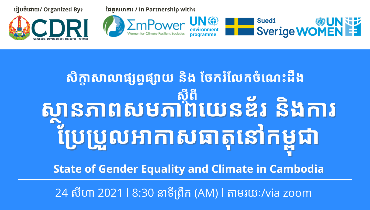
24 Aug
National Dissemination and Knowledge Sharing Workshop
State of Gender Equality and Climate Change in Cambodia
08:30 AM - 12:00 PM
Virutal
The purpose of this workshop is to i) disseminate result the study. ii) to present more evidence of the links between gender equality and climate change and analysing gendered impacts in the key adaptation and mitigation sectors; and iii) to provide country-specific recommendations about how to enhance gender responsive policy implementation and further bolster the integration of gender equality in climate-relevant policy areas.
